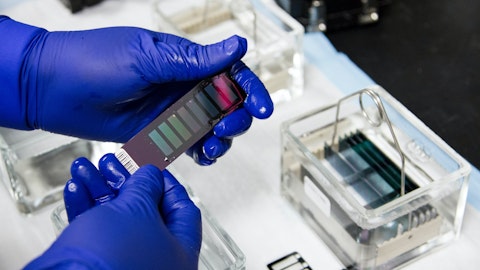In this article, we discuss the 5 best cancer stocks. To read the detailed analysis of the oncology market, go directly to 10 Best Cancer Stocks to Buy Now.
5. Amgen Inc. (NASDAQ:AMGN)
Number of Hedge Fund holders: 55
Amgen Inc. (NASDAQ:AMGN) is a California-based biotechnology company. The company’s oncology drug in focus is Lumakras, which cuts lung cancer risk by 34%, according to the management. According to the Insider Monkey database, 55 hedge funds held stakes in Q2 2022. Two Sigma Advisors was the most prominent stakeholder of the company with over 1.66 million shares, worth $404.29 million.
On August 4, the company announced its plan to acquire ChemoCentryx (NASDAQ:CCXI) for $3.7 billion in cash. The news was responsible for a 109% surge in ChemoCentryx (NASDAQ:CCXI) stock.
Amgen Inc. (NASDAQ:AMGN) has increased its dividends for 10 consecutive years. As of September 28, the company has a dividend yield of 3.40%. The latest quarterly dividend of $1.94 was paid out on September 8 to the shareholders of record on August 18.
On August 5, Piper Sandler analyst Christopher Raymond reiterated a Buy rating on Amgen Inc. (NASDAQ:AMGN)’s shares and raised the price target to $265 from $260.
Here is what ClearBridge Investments had to say about Amgen, Inc. in its Q3 2021 investor letter:
”In health care, Amgen, a biotechnology company, has endured several pipeline setbacks recently, including a slow transition of its Lumakras treatment into first-line lung cancer, a slower than expected development of its treatment for myeloma as well as the company’s asthma treatment Tezepelumab missing its primary endpoint in a Phase III study. We remain positive on the stock, with Amgen’s investments in biosimilars and its pipeline part of our long-term thesis.”
4. Bristol-Myers Squibb Company (NYSE:BMY)
Number of Hedge Fund holders: 69
Bristol-Myers Squibb Company (NYSE:BMY) is one of the world’s largest pharmaceutical companies. The company manufactures drugs and biologics for diseases such as cancer, HIV, cardiovascular disease, diabetes, hepatitis, rheumatoid arthritis, and psychiatric disorders.
Bristol-Myers Squibb Company (NYSE:BMY) is constantly upping its game in the cancer division. On August 18, the company announced the acquisition of Turning Point Therapeutics in an all-cash transaction of $76 per share at a 122% premium. The acquisition was primarily focused on boosting its cancer-fighting drugs, especially with Turning Point’s repotrectinib.
In March, Bristol-Myers Squibb Company (NYSE:BMY) announced that FDA approved its first drug in a new class of cancer immunotherapies as an initial treatment for advanced melanoma. According to the company, the treatment is expected to generate $4 billion in annual revenues for the company.
On September 12, BMO Capital analyst Evan Seigerman maintained an Outperform rating on Bristol-Myers Squibb Company (NYSE:BMY) and raised the price target to $94 from $92.
Here is what Baron Funds had to say about Bristol-Myers Squibb Company (NYSE:BMY) in its Q2 2022 investor letter:
“We established a position in Bristol-Myers Squibb Company, a global biopharmaceutical company focused on discovering, developing, and selling medicines for patients in the therapeutic areas of oncology, immunology, cardiovascular, and neurology. The stock trades at a low valuation relative to its current earnings because the company faces
loss of exclusivity on several key drugs over the next eight years, including Revlimid, Eliquis, and Opdivo.
At the same time, Bristol-Myers has multiple new products in the early stages of launch (e.g., Opdualag, Camzyos, Breyanzi, and Reblozyl), a robust new product pipeline (e.g., Deucravacitinib, Milvexian, and CELMoD agents), and a strong balance sheet combined with strong free cash flow generation that the company can use for acquisitions. Management believes these growth drivers can more than offset the loss of exclusivity and drive revenue growth through the end of the decade. Given the company’s low valuation, if the company can execute, we think there is substantial upside in the stock.”
3. AbbVie Inc. (NYSE:ABBV)
Number of Hedge Fund holders: 71
AbbVie Inc. (NYSE:ABBV) is an American Pharmaceutical company with products stretching across eye care, virology, gastroenterology, immunology, neuroscience, and oncology. In Q2 2022, out of the 71 hedge funds holding positions in the company, the largest stake was held by Arrowstreet Capital with 4.271 million shares of AbbVie Inc. (NYSE:ABBV), valued at $654.148 million.
AbbVie Inc. (NYSE:ABBV) continues to be one of JPMorgan analyst Chris Schott’s favorite large-cap ideas. On September 21, the analyst maintained an Overweight rating on the company shares with a $180 price target and sees a strong case for multiple expansion.
Here is what ClearBridge Investments said about AbbVie Inc. (NYSE:ABBV) in its Q2 2022 letter:
“We added to our health care exposure in the quarter with the purchases of Straumann Holding (OTCPK:SAUHF), a Swiss manufacturer of medical instruments, implants and related supplies for dental procedures, in the secular bucket and U.S. pharmaceutical maker AbbVie Inc. (NYSE:ABBV) in the structural bucket. Straumann is the global market leader in dental implants with 29% overall share, a meaningful position within premium implants and smaller share in value implants. The company is also involved in clear aligners through a series of acquisitions as well as peripheral capital equipment around those businesses.
Growth will come from increasing share in both value implants and clear aligners through expansion in emerging markets on top of market growth in its premium implant business. AbbVie is undergoing a transition in anticipation of loss of exclusivity for its blockbuster Humira in the next several years with several commercial therapeutics, led by Skyrizi for psoriasis and Rinvoq for rheumatoid arthritis.”
2. Merck & Co., Inc. (NYSE:MRK)
Number of Hedge Fund holders: 79
Merck & Co., Inc. (NYSE:MRK) is an American multinational pharmaceutical company. The company produces vaccines, medicines, and even animal health products.
Merck & Co., Inc. (NYSE:MRK)’s blockbuster cancer drug is Keytruda, which accounts for 36% of the company’s total revenue. The drug’s sales in the June quarter grew by 26% on a YoY basis to $5.3 billion. However, the most significant growth prospect for the company’s cancer drug is the awaited approval of additional formulations for Keytruda in Japan, the US, and Europe. If the approval is granted the company can potentially gain tens of thousands of patients.
As of September 28, Merck & Co., Inc. (NYSE:MRK) has a healthy dividend yield of 3.18% compared to the industry average of 1.58%. The company has increased its dividends for 11 consecutive years.
On September 14, Berenberg analyst Luisa Hector upgraded Merck & Co., Inc. (NYSE:MRK) to Buy from Hold with a price target of $100, up from $95.
Here is what Chartwell Investment Partners had to say about Merck & Co., Inc. (NYSE:MRK) in its Q2 2022 investor letter:
“In the Dividend Equity accounts, the three best performers in Q2 includes Merck (NYSE:MRK, 3.6%), up 12.0%. Merck, like other pharma companies, is in a defensive business, but the stock also did well as peak-sales estimates for their flagship drug, Keytruda, have gone up (JPMorgan estimates $32 billion in sales by 2026).”
1. Johnson & Johnson (NYSE:JNJ)
Number of Hedge Fund holders: 83
Johnson & Johnson (NYSE:JNJ) is a New Jersey-based company that produces pharmaceuticals, medical devices, and consumer health goods. The hedge fund sentiment for the company remained unchanged in Q1 and Q2 of 2022. 83 hedge funds held positions in the company, while GQG Partners held the most significant stake in both quarters. However, in the second quarter, Fisher Asset Management increased its holdings in the company by a whopping 798% to 5.729 million shares, worth over $1.017 billion, to become the second largest stakeholder in the company.
Johnson & Johnson (NYSE:JNJ)’s oncology arm is one of the fastest-growing segments of the company. The segment was responsible for $2 billion in revenue in 2010 and reached $12 billion in 2020. In the June quarter, its cancer drug Darzalex alone represented a 40% sales growth on a YoY basis to $1.99 billion.
Johnson & Johnson (NYSE:JNJ) is a dividend king that has consecutively raised its dividend for 60 years. As of September 28, the company has a dividend yield of 2.75% with a quarterly dividend of $1.13. The latest dividend was paid out on September 6 to the shareholders of record on August 23.
In the last 3 months, 12 analysts have covered Johnson & Johnson (NYSE:JNJ) with an average price target of $188.33 and a Moderate Buy rating on the company shares.
Here is what Mayar Capital had to say about Johnson & Johnson (NYSE:JNJ) in its Q2 2022 investor letter:
“J&J is currently our largest position and a long-standing holding. The majority of the group’s sales comes from its collection of pharmaceutical franchises, but a large majority (~45%) comes from its collection of medical device businesses and its consumer brands.
Here’s how JNJ make and spend a dollar of revenues: As of 2021, about 55 cents of that dollar comes from its pharmaceutical sales – sales of drugs to pharmacies and distributors – while 30 cents come from the sale of medical devices, such as surgery equipment and orthopaedics. The rest of that dollar in sales comes from sales of JNJ’s consumer brands such as Listerine mouthwash, Nicorette nicotine tablets and Neutrogena cosmetics.
To make that dollar, however, JNJ typically spends about 25 cents to make the products themselves and another 27 cents on marketing and general administrative functions. This leaves JNJ with about 48 cents on the dollar in profit…” (Click here to see the full text)
You can also take a look at 15 Best Gambling Stocks To Buy Now and 10 Best Stocks for Dividends.





